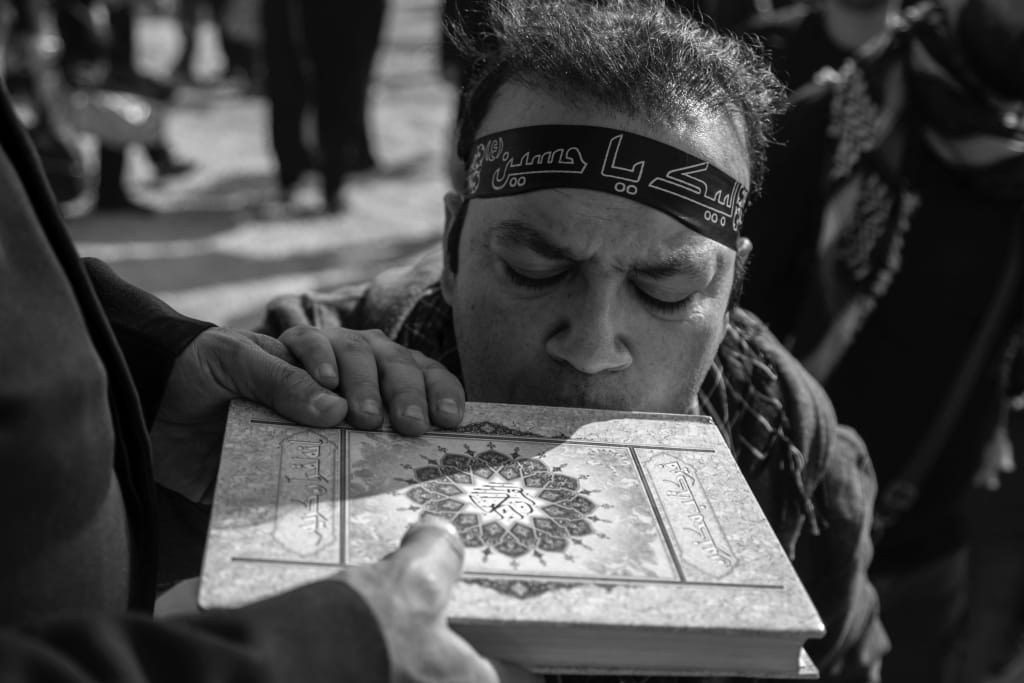Does Religion Hold Us Back?
And will it go away any time soon?

I recently had someone comment on a post I wrote where they stated that religion will soon 'evolve away' and produce a more loving, caring society in it's void. This individual accused all forms of religious expression as discriminating on the basis of factors such as sex, gender, race, and other faith.
It's responses like this that cause me to reflect back on all I've been able to learn about religion just in the past year.
Last Summer I was gearing up to go to Business Management school. I already had my AA squared away (in Information Technology), and I was ready to begin my accelerated track to get my MBA by the age of 21. I was excited. I had nearly a full ride to one of Florida's best Business programs. I was ready to make all those people who had believed in me through high school proud.
In high school, I was a total go-getter. I was in the Top 10 of my class. I was President of Business Professionals of America (and placed on a National level), Head Female Ambassador, and Secretary of the National Honor Society. The school paid me to represent itself in New York or at conferences across the state. I got to talk with CEOs and Executives, and convince them to donate money to our little school. I was told all the time that I was the 'poster child' of my high school, and I reveled in that.
I was used to having a plan and following that plan.
That first week of college, everything changed. It's hard to explain what happened, but amongst many course schedules that weren't fitting together and a lot of spontaneity, I decided to already switch my major. From then on, I began studying Organizational Communication, which lead me to also delve into (and eventually add on as a major) Religion with a minor in Jewish Studies.
My professors valued ideas about human connection. They encouraged dialogue about difficult issues that we all disagreed about. We wrote a lot. We argued a lot. We connected. We understood that subjects such as communication and religion are applicable to all areas of life, technical or not.
I found myself in interesting situations, such as engaging in a weekly Bible/Quran study with a fellow Christian and Muslim. I went to a Mosque, and did the whole 'Hijab thing'. I went to a Presbyterian church and struggled to sing with a hymn book. I had Passover Seder with an Orthodox Rabbi and his wife and laughed until 2 AM. I took a class with a Conservative Rabbi, and attended Temple with him, breaking bread and welcoming the Sabbath. I attended Buddha's Birthday celebration at a Chinese Temple and meditated with community leaders. Ultimately, I studied a lot. I had many conversations with many different walks of life.
The more I learned, the more I realized how much I didn't know or couldn't know.
To talk about religion, as a phenomenon with an end, as the commentator suggested, is also to assume a specific definition of what religion is. Religion, when we attempt to create a universal definition of it, is quite complicated and difficult to understand.
Religion is not just a belief in God or gods. It's a community exercise. For most of our human existence, we couldn't have fathomed our beliefs as some sort of 'religion' because there were no other 'religions' to pit it next to. Defining Christianity or Buddhism as a 'real' religion also subjugates other divine beliefs. How do we approach the beliefs of those removed from 'advanced society'— the ones living in the untouched regions of Brazil or Indonesia? Or, for that matter, the beliefs of Ancient Greece or Rome? Are those 'real religion'? What about Daoism? Greek Philosophy? Modern Philosophy? Where does the line blur?
Globalization, which has slowly evolved for thousands of years, forces us to engage in this comparative exercise. It forces us to reflect on what it means to be human, to believe in things that others don't, to wear different skin colors, to speak different languages, to engage in different sexual practices, to dress ourselves with different clothes. These factors are as vital to 'religion' as what we call our God, be it Yahweh, Allah, even technology, secular science, or the human body.
This confrontation leads us to do insane things. How can we cope with the fact that we see the world through different eyes? A variety of perspectives imply a certain kind of loneliness within a personal worldview.
For some, this causes us to dream of a world of peace and prosperity. We are motivated, driven to force that world into existence.
Others cope by traveling and spreading "the Word" on missions trips, while others still see the way to do this by becoming dictators and controllers and going on killing sprees. Same points of inspiration. Different executions.
We will always find ways to make 'religion' (or the absence of it) fit within our own motives, no matter how sinister. This, I've found, is more of a reflection of our human nature than it is the existence of complicated systems of belief.
Though we may tell ourselves that the world is becoming more secular, even those attempts to move away from religion are religious in nature. I had a brilliant professor once say that secularization is not the absence of religion, but rather a restructuring of religion. Secularization asks the questions, "How can we reshape religion in a way that benefits us? In a way that makes sense to us? In a way which is convenient for my people or another people?"
Religion is not something so easy to fall by the sidelines, as that response suggested. I'm not sure if the Islam or Hinduism we see today will be the same in 50 years, 500 years, or 1000 years. It will probably look very different, perhaps something unrecognizable today as what we consider religion to be. In spite of this, it is our human nature to gravitate to these concepts that transcend the self.
So long as we are human, we will still have a complex on-going relationship with religion. We must learn to embrace this dialogue and use it as a platform for peace and love (like Jesus and Muhammad said) rather than a wall that divides us further.
About the Creator
Allison van Tilborgh
Scholar of Communication and Religion. Editor of Interfaith Now on Medium. Amateur conversationalist.






Comments
There are no comments for this story
Be the first to respond and start the conversation.